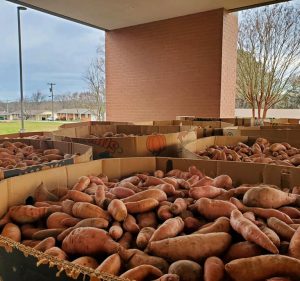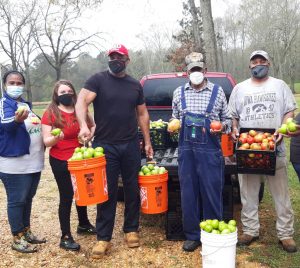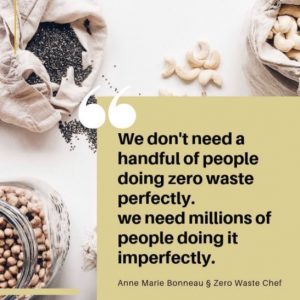by Molly Veydovec *
Are you concerned about the environment?
Get out there and GLEAN!
If you’re familiar with the topics of gleaning and the environment, you’ve likely asked yourself:
“What exactly is food waste?”
“How much food is wasted?”
“How does food waste affect the environment?”
“How does gleaning help food waste?
Let’s answer those questions.
 What is food waste?
What is food waste?
There are two kinds of “food waste”. First, there is food loss. That’s food that goes unharvested due to factors beyond a farmer’s control. This is the kind of food that can be gleaned and shared with neighbors in need.
Then, there is the type of food waste you’re most familiar with: That’s the food that spoils (ie: ends up in your kitchen trash can) or doesn’t make it to the market due to the way it looks. This is the kind of waste you can prevent without ever leaving your home.
How much food is wasted every day?
The short answer is a lot! A 2013 FAO (Food and Agriculture Organization of the United Nations) report, which analyzes the impacts of food waste on the environment, says nearly one-third of all food produced in the world for human consumption does not find its way to our tables. Yikes.
How does food waste hurt the earth?
The statistics are overwhelming on this. Let me throw three mind-opening facts at you:
- It produces huge amounts of greenhouse gases. If food waste were a country, it would be right behind the U.S. and China as the third biggest greenhouse gas producer.
- When food is wasted, all of the inputs that created the food are wasted as well. Unsurprisingly, agriculture uses a large amount of water. Shockingly, a single glass of milk poured down the drain results in the loss of the 1000 liters of water used to produce it.
- The World Wildlife Fund (WWF) reports that 1.3 billion tons of food either never leave the farm, get lost or spoiled during distribution, or are thrown away at the retail and consumer levels. This would be enough calories to feed every undernourished person on the planet.
How can gleaning help?
The WWF also states that more than 10% of all greenhouse gas emissions from the food system could be reduced if we simply stopped wasting food.

Gleaning prevents problems with a “two birds, one stone approach.” Field gleaning prevents food waste AND gets that food to people who need it most, accomplishing its highest purpose. Every moment spent gleaning salvages dozens of resources, as well as puts food on the table of a neighbor in need.
Every time you partner with The Society of St. Andrew, you are playing a role in preventing waste and getting fresh fruits and vegetables to people in great need.
Here are a few other ways you can reduce food waste:
- Make a grocery list. And stick to it. Be aware of how much your family can really eat in a week, especially when it comes to perishable items.
- Be willing to consume imperfect foods. The strange-looking pepper? It tastes the same. We have to get over our obsession with perfection at the grocery stores.
- Give. Have extra? Pass it along to a friend, donate to a food pantry, drop it off at a shelter.
- Get creative. Put wilting spinach in eggs or a smoothie. You can freeze nearly anything or buy it frozen to begin with. Save scraps for homemade broth. Compost. Heck, feed the squirrels!
- Create awareness. Talk openly about food waste in your community. Our generation needs to get serious about making this a front and center priority.
 Oh, and lastly … don’t get overwhelmed.
Oh, and lastly … don’t get overwhelmed.
I’m the queen of getting overwhelmed and I get it. It’s the number one killer of all well-meaning efforts. I saw one of my favorite quotes about waste from chef and activist Anne-Marie Bonneau the other day and it will perfectly sum up your efforts on this.
You can make a difference today!
Sign up as a volunteer to glean the fields with The Society of St. Andrew and make a small donation to cover the costs of fresh fruits and vegetables being rescued across the nation today by SoSA’s Gleaning Network.
*Molly Veydovec is a SoSA Volunteer
Sources:
Food and Agriculture Organization of the United Nations
http://www.fao.org/docrep/018/i3347e/i3347e.pdf
World Wildlife Fund
https://www.worldwildlife.org/stories/fight-climate-change-by-preventing-food-waste
MAY
2021

